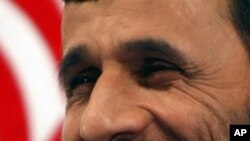The United States and its allies are pursuing further steps to halt Iran's nuclear program, after the United Nations Security Council on Wednesday approved sanctions against Tehran.
With the U.N. sanctions passed, White House Press Secretary Robert Gibbs says the Obama administration's next step is to work with U.S. lawmakers and allies worldwide to keep pressure on Iran. He says that pressure includes unilateral U.S. sanctions to accompany the U.N.'s action.
"U.N. sanctions are not a magic bullet. There are steps that we can take as a government, and have. There are steps that Congress will take, as part of our government. There are steps that the European Community and our allies throughout the world may take. And we are working with the [U.S.] House [of Representatives] and Senate on a bill that I understand is currently in conference," he said.
Both chambers of Congress must resolve differences in their versions of the legislation before it can go to President Barack Obama for his signature.
The speaker of the House of Representatives, Nancy Pelosi, says the U.S. sanctions will target Iran's petroleum industry. House Committee on Foreign Affairs Chairman Howard Berman says Congress will pass the sanctions later this month.
European leaders are expected to agree next week to impose sanctions on Iran aimed at the country's banks and insurance companies. EU diplomats say a final vote could come in July.
Gibbs says the EU sanctions will also be an important statement. "We will continue to work with friends and allies to create and maintain the coalition that we have, to demonstrate to the world how seriously we all take Iran's nuclear program," he said.
Iran says its nuclear program is for peaceful purposes.
Wednesday's vote in the Security Council was 12-to-2 in favor of the sanctions. Brazil and Turkey voted against the measure; Lebanon abstained.
Permanent Security Council members Russia and China voted in favor of the sanctions, after the United States assured them that the measure would not interfere with their ability to trade with Iran.
Russia's Foreign Ministry said Thursday that a deal to deliver S-300 surface-to-air missiles to Iran would not be affected by the new sanctions.
But at a White House press briefing, Robert Gibbs mentioned a story from Russia's Interfax news agency that quoted an official with the Russian agency that supervises arms sales as saying that Moscow is freezing the contract to sell the missiles.
"The resolution, as passed by the Security Council, calls on all states to exercise vigilance and restraint in any arms sales that are not prohibited. I would note that over the past year-and-a-half, that the Russians have not transferred the system I think you are talking about to the Iranians, and there are reports today that indicate they do not plan to," he said.
Russia signed a contract in 2007 to sell Iran the missiles, but it has yet to deliver them.
US, Allies Move Forward After New UN Security Council Sanctions Against Iran









